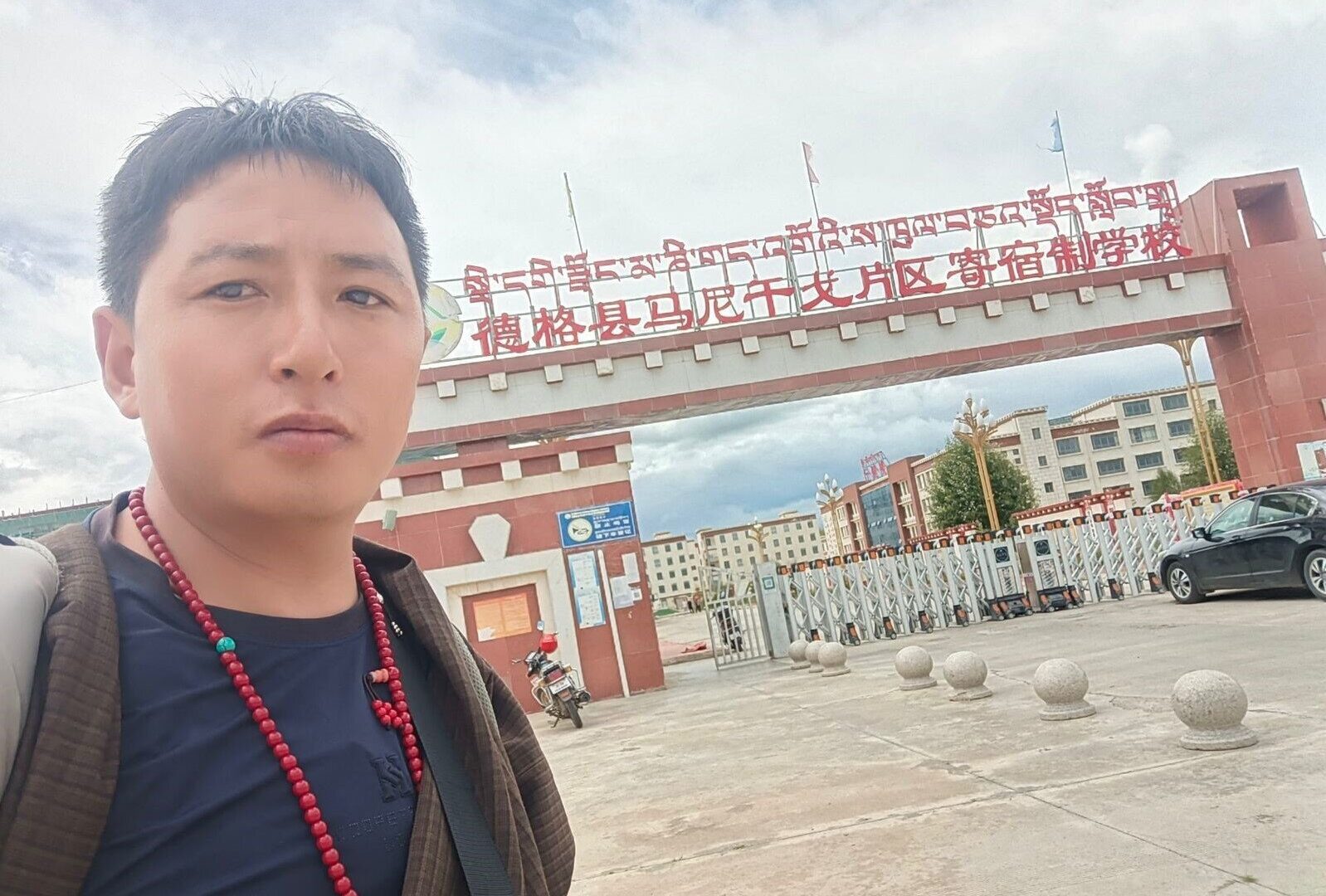
Former Tibetan political prisoner Tashi Wangchuk attacked
Tashi Wangchuk (1), a Tibetan businessman, language advocate and former political prisoner, was attacked on Saturday 19 August.
Through local sources, Tibet Watch has established that Tashi Wangchuk went to Darlak County in eastern Tibet (2) on the evening of 19 August with the aim of raising awareness about the disappearance of the Tibetan language from schools in favour of Chinese. At 7:14pm, he filmed a video near to Darlak County Nationality Middle School, which he posted on the Chinese social media platform Douyin.
He subsequently travelled to a hotel where he was hoping to stay. At around 8pm, Tashi Wangchuk’s hotel room door was forced open and he was beaten and kicked by a group of men wearing masks for around 10 minutes. He believes he was followed to his hotel from the school.
Tashi Wangchuk begged the group to stop attacking him and called to the hotel owner to contact the police. Police arrived at his hotel room at around 9pm and took him to the police station for questioning, where Tashi Wangchuk stayed until around 11:30pm.
After being rejected from the hotel he was staying and several other hotels, he instead went to Darlak County Hospital, where he asked the doctor to check his head. The doctor responded that the CT scanner was broken. Tashi Wangchuk spent the night on a stool on the first floor of the hospital, where he composed a detailed account of the day’s events, including his beating and what he referred to as “crime by gangs and illegal acts by government officials who break the law and cover for each other.”
John Jones, Head of Campaigns Policy and Research at Free Tibet said:
“Whoever carried it out, this attack on Tashi Wangchuk is hugely concerning. Tashi Wangchuk always was, and remains, a peaceful advocate for promoting the Tibetan language, a language that is facing an existential threat. He has already sacrificed his liberty and safety to urge China to comply with its own constitution and allow the teaching of Tibetan. Authorities must act on these concerns and guarantee that Tashi Wangchuk sees no further threats of violence or imprisonment. We, and the world, are watching.”
Tenzin Choekyi, Senior Researcher at Tibet Watch said:
“Tashi Wangchuk’s advocacy for Tibetan language, a right guaranteed under the Chinese constitution, was criminalised at a time when mother-tongue protection groups in Tibet were blacklisted as ‘underworld forces’ under China’s 2018 nation-wide campaign against criminal gangs. Not only were his rights trampled upon, the court of his home residence carried out the entirety of his trial in Mandarin, a language that has systematically replaced Tibetan language from all spheres of Tibetan society. Meanwhile, two years after his release, he is at risk from real criminals, with little protection. This is the hypocrisy of China’s criminal justice system.”
Tashi Wangchuk, is from Kyegudo in Yulshul (Chinese: Yushu) Prefecture eastern Tibet. He came to international prominence after speaking to the New York Times in 2015 about his efforts to file a lawsuit against local authorities after local Tibetan classes were shut down. He also expressed fear for the future of Tibet’s language and culture.Tashi Wangchuk insisted on being named and identifiable in the New York Times’ article and video documentary, which were released in November 2015 (3).
In January 2016, Tashi Wangchuk was arrested, held in a secret location and tortured. After spending two years in pre-trial detention, he was found guilty of “inciting separatism” and sentenced to five years in prison (4). For the duration of his detention and imprisonment, Tibet groups launched a global campaign, demanding that Tashi Wangchuk be released.
Following his release from prison in January 2021, Tashi Wangchuk has continued to advocate for authorities in Tibet to respect the Constitution of the People’s Republic of China, which provides for the teaching of what it calls “minority” languages, including Tibetan (5).
In January 2022, Tashi Wangchuk approached government offices in Jyekundo (Ch: Yushu City) to call for the preservation of the Tibetan language. This led to him being summoned for an interrogation session at the Public Security Bureau of Yushu. He has also travelled to other schools in occupied Tibet and collected textbooks showing the emphasis on Chinese-language instruction over Tibetan (6).
While Tashi Wangchuk carries out his peaceful language advocacy, authorities across occupied Tibet have imposed policies to marginalise or even eliminate the Tibetan language from the public sphere. This includes closing down Tibetan language schools and the Chinese government’s residential boarding schools policy, in which almost one million Tibetan children between the ages of four and 18 have been placed in boarding schools and pre-schools. In this environment, children have limited access to their families and are placed in a teaching environment that promotes the Chinese language and Chinese Communist Party-approved history over Tibetans’ own language and history (7). The policy has been criticised by the United Nations Committee on Economic Social and Cultural Rights, which in March 2023 urged China to close down the residential school system (8).
ENDS
Contact:
John Jones
Head of Campaigns, Policy and Research, Free Tibet
+44 (0)7591 188383
Notes for editors
- Pictures of Tashi Wangchuk are available here
- Darlak County, Golog Tibetan Autonomous Prefecture, (Ch: Dari County, Guoluo Tibetan Autonomous Prefecture, Qinghai Province)
- Edward Wong, ‘Tibetans Fight to Salvage Fading Culture in China’, New York Times, 28 November 2015 https://www.nytimes.com/2015/11/29/world/asia/china-tibet-language-education.html
- Lily Kuo, ‘Activist sentenced to five years in prison for promoting Tibetan language’, The Guardian, 22 May 2018 https://www.theguardian.com/world/2018/may/22/activist-sentenced-to-five-years-in-prison-for-promoting-tibetan-language
- Constitution of the People’s Republic of China, Article 4 www.npc.gov.cn/englishnpc/constitution2019/201911/1f65146fb6104dd3a2793875d19b5b29.shtml
- ‘Former political prisoner continues advocating for Tibetan language’, Tibet Watch, 21 January 2022 https://www.tibetwatch.org/news/2022/1/21/former-political-prisoner-continues-advocating-for-tibetan-language
- ‘China: UN experts alarmed by separation of 1 million Tibetan children from families and forced assimilation at residential schools’, OHCHR, 6 February 2023 https://www.ohchr.org/en/press-releases/2023/02/china-un-experts-alarmed-separation-1-million-tibetan-children-families-and
- Committee on Economic, Social and Cultural Rights, Concluding Observations, 6 March 2023 https://tbinternet.ohchr.org/_layouts/15/treatybodyexternal/Download.aspx?symbolno=E%2FC.12%2FCHN%2FCO%2F3&Lang=en

